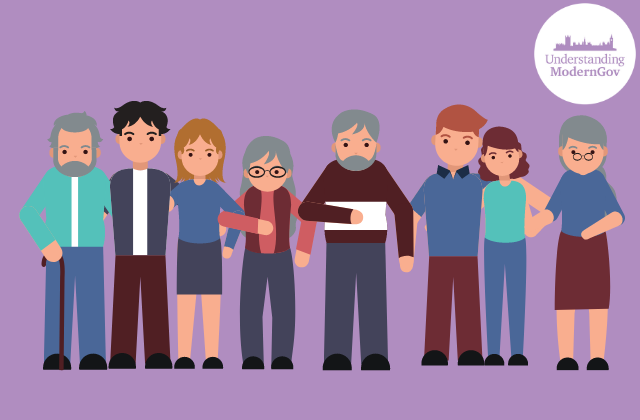Managing a Generational Diverse Workforce - Best Practices, Tips & Strategies from a Communication Expert
 Chloe Martin
·
5 minute read
Chloe Martin
·
5 minute read
For the first time (ever), there are five different generations in one workforce – also known as the “5G workforce.” This brings unique challenges and benefits to managers across the UK, not just the public sector.
As generational diversity within teams is something that’s often unnoticed, we’re here to tell you all about it and how it may already be impacting your team. To do that, we spoke to Expert Communication Coach, Anne Walsh, who has extensive one-to-one and group business coaching experience in the private, corporate, public and charitable sectors.
Ready to learn about the different generations in your team and how to manage them effectively?
The Different Generations and What They Mean
1. The Silent Generation/Traditionalist (1927 – 1945)
The oldest generation of the workforce, this group are generally partners, managers or senior staff in a workplace. Some are “technically” retired, but can be called upon to take part in work. This generation has a strong work ethic learnt from their parents – they believe that you earn your way through hard work. They’re loyal employees and will probably have stayed with the same employer their whole working career.
2. Baby boomers (1946 – 1964)
Baby boomers were the first to experience post-war consumerism and a rising middle class. In terms of communication, it means they grew up making phone calls and writing letter. This is why they place high value on in-person interactions, and they tend to be hardworking in their career – so much so, that they’ve been called the “workaholic” generation.
3. Generation X (1965 – 1980)
Generation X are the least studied generation when it comes to working. But, we do know that they value work/life balance, they’re very independent and self-sufficient. Although they’re not as tech savvy as the younger generations, they have been known to be happy to pick up new systems and technology.
4. Millennials/Generation Y (1981 – 1996)
Millennials are currently the largest in the workforce. According to research, Millennials aim to work smarter rather than harder – often making them overly dependent on technology. They also thrive on being innovative and creative, but they look for a high amount of impact from their employers.
5. Generation Z (1997 – 2012)
Generation Z is the youngest generation in the workforce. They’re the first generation to grow up as true digital natives, even more than millennials. Gen Z is known for being “constantly connected” to the world and is considered the most tech-savvy group out of them all. They have shorter attention spans and require immediate feedback from employers. But, they’re very creative, flexible and self-reliant – often having some similarities to Millennials.
Now we know more about the generations that currently make up our workforce – and those likely to be in your team - let’s get straight into the questions.
Managing a Generational Diverse Workforce Q&A with Communications Expert, Anne Walsh
1. Each generation will have different needs and expectations when it comes to communication in the workplace, how can you avoid potential misunderstandings between different generations in one department or team?
"With all teams, but particularly those encompassing different generations, it is essential to create a climate of psychological openness with all staff members to help them feel able to share creativity and ideas. This type of openness is achieved through increased empathy and understanding between individuals across the different age ranges and is developed further by individuals seeking to understand how life is for the other party: their motivations and values.
Older workers will realise that younger people are likely to be entering the workplace with higher levels of personal debt than in previous generations and this inevitably affects their attitudes towards career, home and family. They will be deeply concerned with conserving the planet and living more sustainably, while older generations may be focused on complex familial commitments (caring for elderly parents, or grandchildren) and focusing on their third age/retirement strategy. Demonstrating understanding of the others’ position and respecting this helps diffuse any potential misunderstandings."
2. What are four best practices for approaching generational diversity?
"Building a culture of openness is essential firstly. Secondly, diversity and inclusivity should form the bedrock of teams and organisations. Studies show that diverse teams offer more creativity and this I believe is the third essential practice that needs to occur.
Lastly, knowledge-sharing and exchange of skills are necessary so that the whole team benefits from the expertise and experience from each other. This is not just about the traditional model of older people mentoring younger colleagues, but also younger members sharing their expertise with older colleagues and enabling them to upskill (technology is one area where this can happen)."
3. This is the first time we have 5 different generations in one workforce. Do you think this serves benefits or negatively impacts the public sector?
"Having this extraordinary range of different generations in the workforce can only benefit the public sector, as the workforce needs to provide an accurate reflection of the society we live in. This breadth of range across the generations provides an opportunity for each generation to keep actively communicating with, relating to and learning from each other. Continuing engagement across all generations (despite challenging our initial assumptions about perceived generational gaps), keeps our mindsets flexible and open and is vital for our well-being."
4. Say you’re a manager of a large, generationally diverse department, how would you go about bringing all these generations together?
"Alongside creating a climate of diversity, inclusion and openness: managers need to develop communication across all the generations through increasing soft skills, particularly empathy and rapport. This will also mean raising psychological awareness of the team as a whole and challenging generational stereotypes when they arise in attitudes and behaviour.
In teams where a more traditional mindset prevails, younger team members with serious points to make can be viewed by older colleagues as less credible due to their perceived youth. While older workers could be denied training and development in their late fifties and sixties as it’s assumed they are moving towards retirement. Ageism is a narrow, limited way of assessing human value, if anything it diminishes human potential across all the generations. An astute manager will know this and work consciously to exclude it from the group dynamic."
5. What are three things you think must be included in a management strategy that will suit all generations?
1. "Investment in individual and group training and development is essential. This can occur through the channels of external training providers, personal coaching, academic courses, professional qualifications, or in a less structured way through coaching and mentoring in-house and skills-swaps.
2. Encouraging team members to adopt a long-term perspective to their current role by looking for growth opportunities and stretch assignments to add built-in development opportunities in-post. This makes team members less likely to want to leave because they feel they are valued and being invested in. It is expensive and time-demanding to recruit new employees to replace leavers, so it makes more sense to develop the team members you have. The stereotype is that younger workers tend to leave for other jobs after a couple of years, but this may be less likely to happen if there is an incentive to stay and develop their potential right where they are.
3. Flexible working practices. A manager who allows flexibility in the workplace (including working from home), is demonstrating understanding of not just the modern workplace (where employees have vital life needs outside of work), but the human condition. The hybrid way of combining remote and in-the-office working has legitimised this and managers need to endorse flexible working practices, so that all generations across the team feel their position is understood."
6. Managers may find that generational conflicts may occur in their team or department at some point or another, so how can they mitigate the impact of generational differences in the workplace? Such as generational stereotypes.
"Even the most psychological-conscious individual will internalise generational stereotyping, so it is incumbent on the manager to lead the way, speak about and demonstrate their awareness of these limiting stereotypical views. This means paying attention to their own communication with the team and ensuring that all team members across all generations are equally respected and treated the same. The manager is then leading by example, and this provides a best model of practice for the team.
If team members from different generations are not speaking much to other colleagues across different generations; this can potentially lead to conflict, so the manager must use their heightened observation skills to take action to get people talking to each other. This can mean actively coaching team members to ask open-ended questions, improve listening skills and adopt a person-oriented way of focusing on the other.
This does take effort from both the manager and team members, and although there may be resistance to these initiatives initially, the pay-off is huge as team members from all generations will take these attitudes and skills forward with them as they progress within the organisation and move onto management and leadership positions themselves."
Successfully Lead Teams and Improve Communication With Our Training Courses
From building effective communication strategies to mastering positive communication in times of crisis, our Confidence and Resilience courses have a lot to offer. View the full list of upcoming courses and secure your place.
2+ years in SEO and content marketing. Striving to help public sector professionals develop their skills and learn something new through high-quality content.







